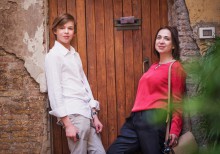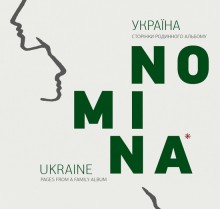It is elegant, pleasant to the eye and touch. Most importantly, it is very rich in information. This illustrated “family album,” which opens with a dedication to the author’s son Artem, should be a go-to book not only in Ukraine. After all, it includes the English version of the text so that foreigners could read it too.
What we are speaking about is the book NOMINA. Ukraine. Pages from the Family Album, which was conceived and made by Valentyna Kyrylova and her creative team. Its seven chapters include 158 names associated with the Nobel Prize, the Order of the Legion of Honor, the Oscars, and other most treasured awards of the world...
Shortly after our independence, a lot of books like this appeared. What makes your publication special?
Valentyna KYRYLOVA: “The idea was there for all to see: our desire was to inform or remind Ukrainians of iconic names and bring them together under one cover. It was nothing new really, I just made it like I wanted to. That is, precisely like a family album with no labels signifying one’s ‘goodness’ or ‘evilness,’ where people may have different origins and ascribe to different religions, just like in a family. As for new names, many of them had been known to a narrow circle of specialists, such as biologists or mathematicians. I saw gathering information for a wide readership as my task. My focus was on the natives of Ukraine who were somehow connected to it and brought it glory. Our enemies spent a lot of time knocking out of us our sense of the unity of the nation, its achievements, and historical continuity. The Soviet inferiority complex, unfortunately, is still there. Iconic figures related to our country have been ‘taken away’ by the world, our neighbors ‘appropriated’ them, and we seem to have accepted that... I wanted to provide some foothold to my son and his generation, and not only to them. We, despite the long period of building an independent Ukraine, are still failing to comprehend our unity and feel the ground under our feet. I mean, life-giving ground! We are just fighting for quotas for Ukrainian-language broadcasts and hold ‘I speak Ukrainian’ flashmobs. An entire generation is already growing old, but keeps up the same talk...
“For me, a nation’s history begins with stories of its members. I see the fate of the individual and their path in life as the most interesting thing, which can serve as a positive or negative example for others. One can read history from individual fates. Of course, fate can be ‘rewritten’ as well, but it is easier to do with history. The latter is only an interpretation of events, after all.”
Some people are proud of Ukraine, while others call it a harsh stepmother...
V.K.: “My sense of our history and our land can be simplified to distinguishing between two Ukraines: the country which I love and Ukraine the state which has existed as an independent nation for a quarter century. I am not proud of the state so far, and it is the latter which gets called a stepmother, most likely. The civil society is a different matter. During the Euromaidan, what I was pleased to see were our people, their self-organization and readiness to self-sacrifice.”
Artem, how many unknown names have you met in the book? Whose story has made the deepest impression?
Artem: “I am ashamed to say this, but I had never heard about a half of them. I knew about some of them existing, but knew nothing about their lives. The book has been a revelation to a great extent. I took interest in the fate of Sergei Prokofiev, who shuttled between the USSR and the Western world. I was surprised to learn that Nikita Khrushchev and Leonid Brezhnev were of Ukrainian origin; these figures are not too positive, but they were iconic politicians of their time. I am proud that Anton Chekhov also came from Ukraine, because I love to read his short stories.
“I am greatly interested in chapters 6 and 7, which deal with space industry scientists and world-famous actors and musicians who have won awards including the Oscars, Emma, and Grammy.”
Valentyna, when did that creative idea actually appear?
V.K.: “It happened seven years ago, when I compiled the first lists. My son was growing up (he is 15 now) and wanted to explore things, having lived through two revolutions. Artem, unlike me, is very interested in politics. According to the plan, NOMINA is not completed yet. At the end of the book, I added a list of names, including three Nobel Prize winners. I want to involve all concerned people through the website nominabook.com and get them participating in a joint search for new discoveries.”
Artem, do you have a desire to share your impressions of the book with your peers?
Artem: “The desire, of course, is there. I also doubt whether it will be interesting to all my peers. However, it will definitely be to some of them, and not only in Ukraine. I have friends abroad and they already have this book. Some of them, like my Polish friend, were surprised to learn that some of their iconic figures came from Ukraine. He took a particular interest in Joseph Conrad and Stanislaw Lem. My mother’s French friend Caroline was surprised to learn that Serge Gainsbourg came from Ukraine, and she checked it, only to get even more surprised! NOMINA covers all continents: North and South America, Asia, Europe, Australia...”
V.K.: “I was initially surprised too, and asked myself, did all these figures really come from Ukraine? We should build interest in our country basing it on world-renowned iconic figures such as Igor Sikorsky, Vladimir Vernadsky, Igor Stravinsky, Serge Lifar, Nikolai Berdyaev, Pyotr Tchaikovsky, and George Kistiakowsky. I see it as essential. Tapping the living history through specific people, when the biography itself speaks out is extraordinarily important. Figures of Ismail Gasprinski and Bekir Coban-zade are conceptually important. We are one family with the Crimean Tatars and stand together with them.”
Did you understand at first how valuable in every sense this book would become?
V.K.: “It is a whole new phase of my life. Moreover, it taught me my life lesson. In particular, I have learned to give up on a previous vision of the project. The original idea and the end product are different things. The initial concept was built on a fictional story of me discovering somewhere in the attic a family album that I needed to transfer to my son. However, the ArtHuss family printing firm convinced me to completely change the preliminary layout. My son Artem, my daughter Mariana, designer Lara Yakovenko, and artist Valeria Kucher made up the young team which led me on that path. I felt incredible pleasure from cooperating with like-minded people! I am very satisfied with the album’s look.”
Finally, what helped you personally with self-determination back in your time?
V.K.: “It was back during the perestroika. Three women helped me to find my identity, and it was principally my mother, who I still see as a fine example of sincere popular patriotism. The other two were my co-worker at the Molod Publishing House Natalia Spodarenko and never-to-be-forgotten Solomia Pavlychko. Their role in my fate was extremely important. I want this publication to give impetus to self-determination for those residents of our land who are still in search of it. Without too much pathos, I would say that we really have something to be proud of. We have every reason for self-respect and a tremendous foundation on which we should build our future.”








